Over a Century of Pushing the
Boundaries in Every Arena
From research to discoveries of life-saving cures, from innovations in patient care,
to advancements in public health, and to world-class medical education.
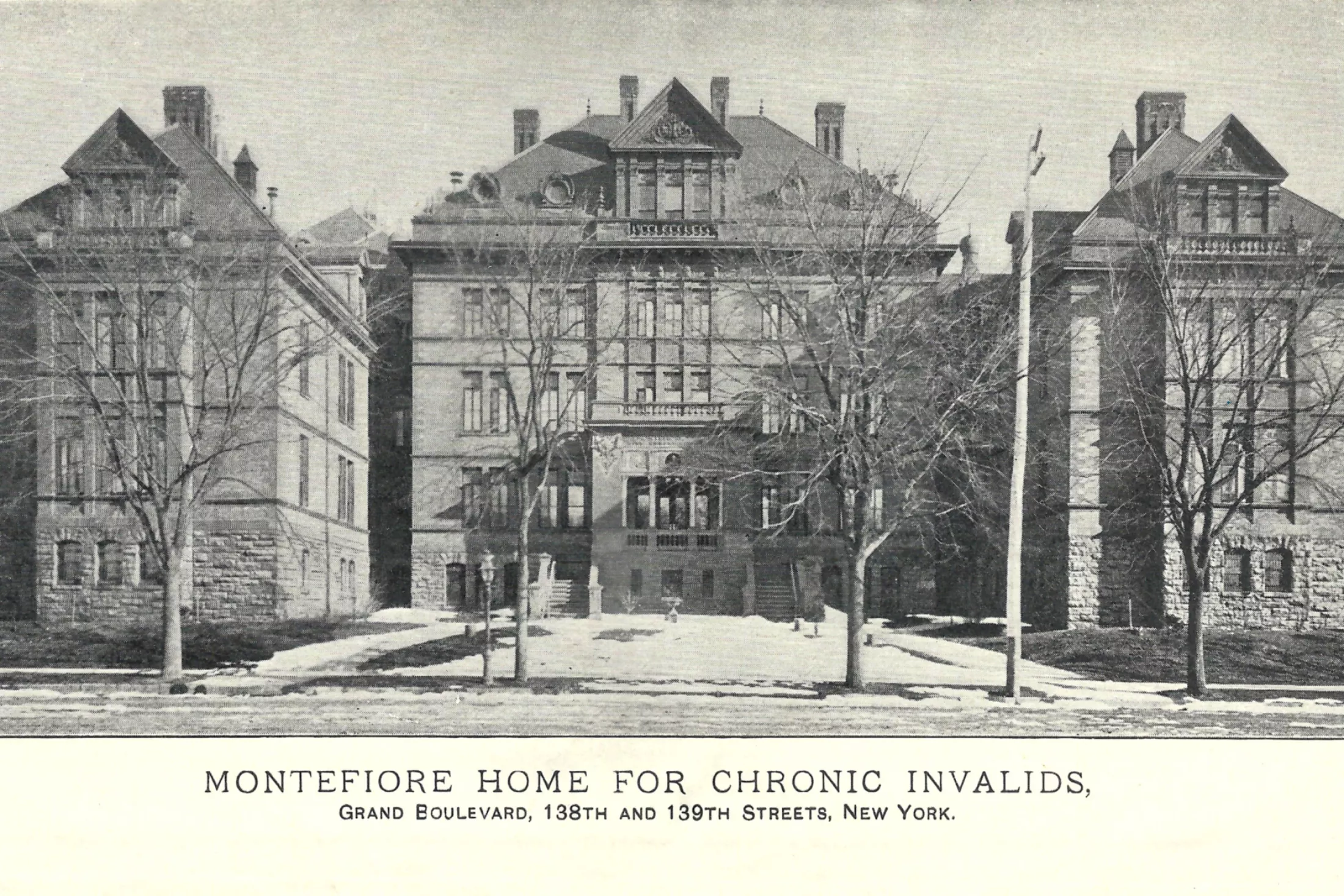
1884–1900
Founded in 1884 by Jewish philanthropists, the Montefiore Home for Chronic Invalids offered care to people denied treatment by other medical institutions. Our physicians were at the forefront of tuberculosis diagnosis in 1890, when the disease was a leading cause of death in America.
1900–1920
In 1901, asthma patients at Montefiore were treated with adrenalin chloride, one of the earliest clinical uses of this drug.
Montefiore established one of the nation’s first hospital-based departments of social work in 1905 to better serve patients after discharge. The hospital expanded in 1912 with a new facility in the Bronx and began a historic community partnership, pioneering a new model of offering healthcare to anyone in need.
A noteworthy trailblazer in medicine, Montefiore’s first female physician joined the house staff in 1916.
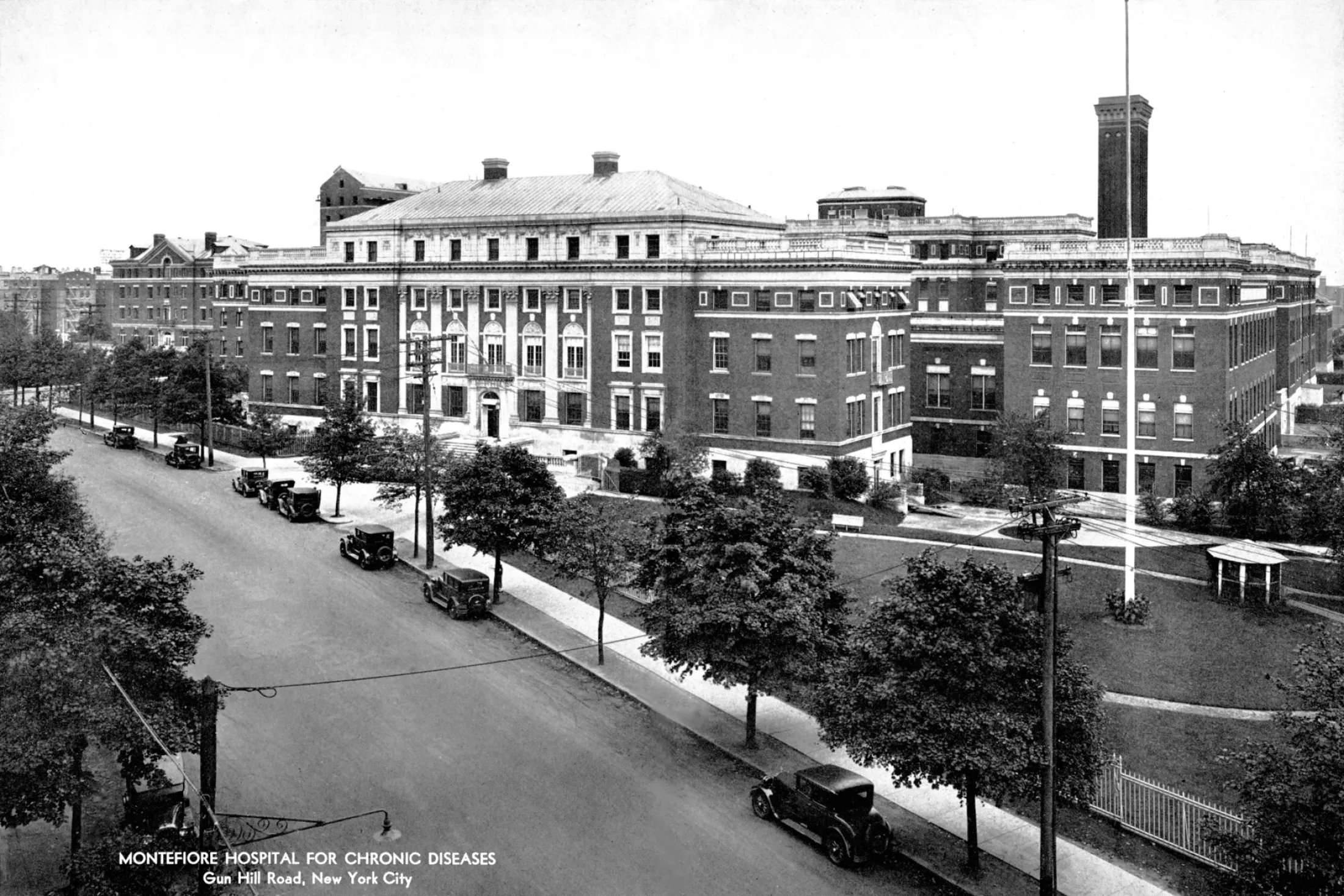
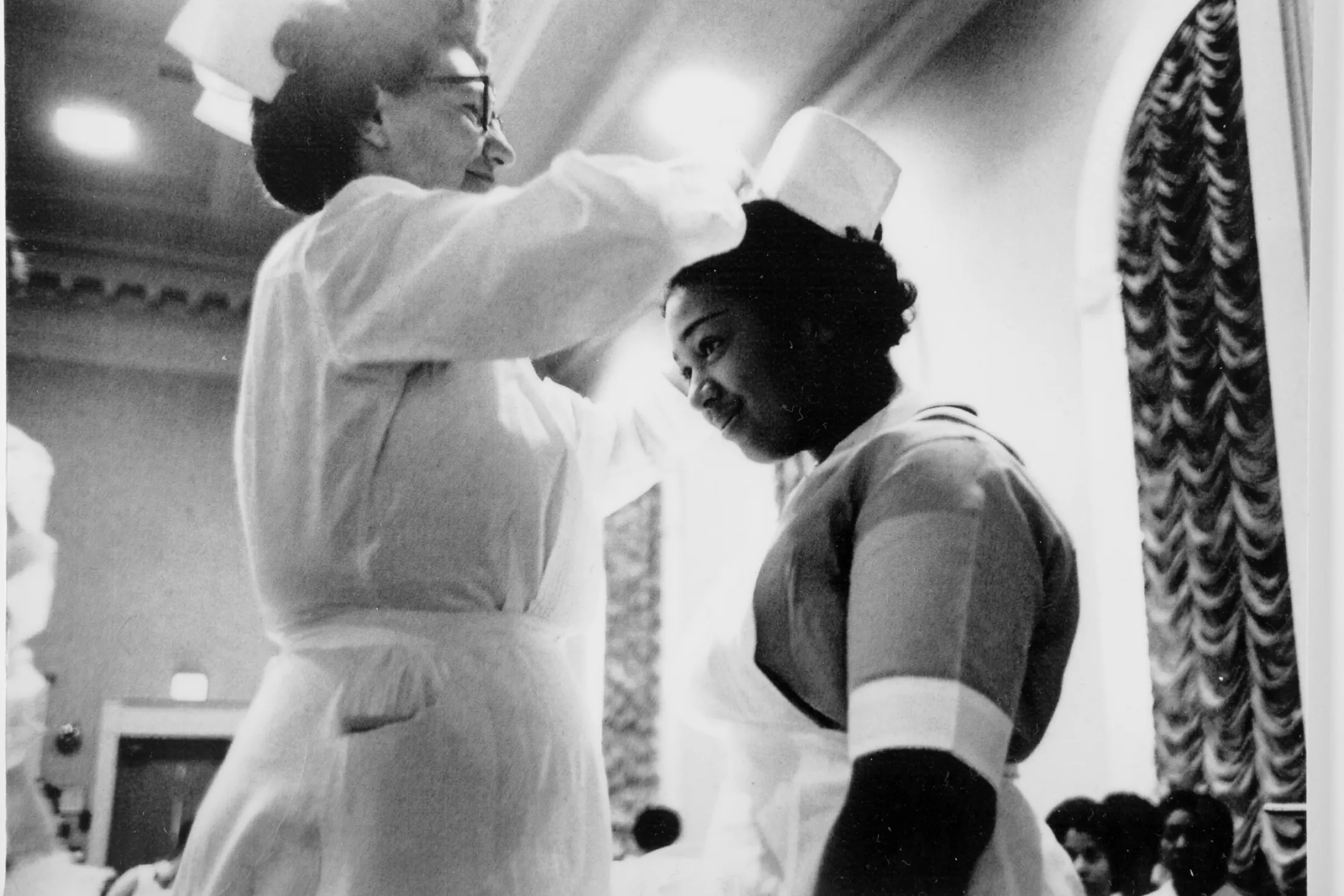
1920s–1940s
Alongside innovations in the diagnosis and treatment of heart disease, Montefiore physicians were instrumental in developing the cardiotachometer, a device used to measure heartbeats, in 1928.
In the 1930s, a time when integration was rare, Black medical residents were accepted to train at Montefiore.
Montefiore established the first hospital-based Department of Home Health Care in 1945 and, a few years later, created one of the nation’s first health maintenance organizations (HMOs) to meet patients where they lived.
Elsewhere in New York City during that same decade, Yeshiva University President Dr. Samuel Belkin began acting on his vision for a new medical school, the future Albert Einstein College of Medicine. Coordinating with Mayor Vincent Impellitteri, Dr. Belkin committed to providing physicians to care for patients in the 1,400-bed Bronx Municipal Hospital Center that was then under construction.
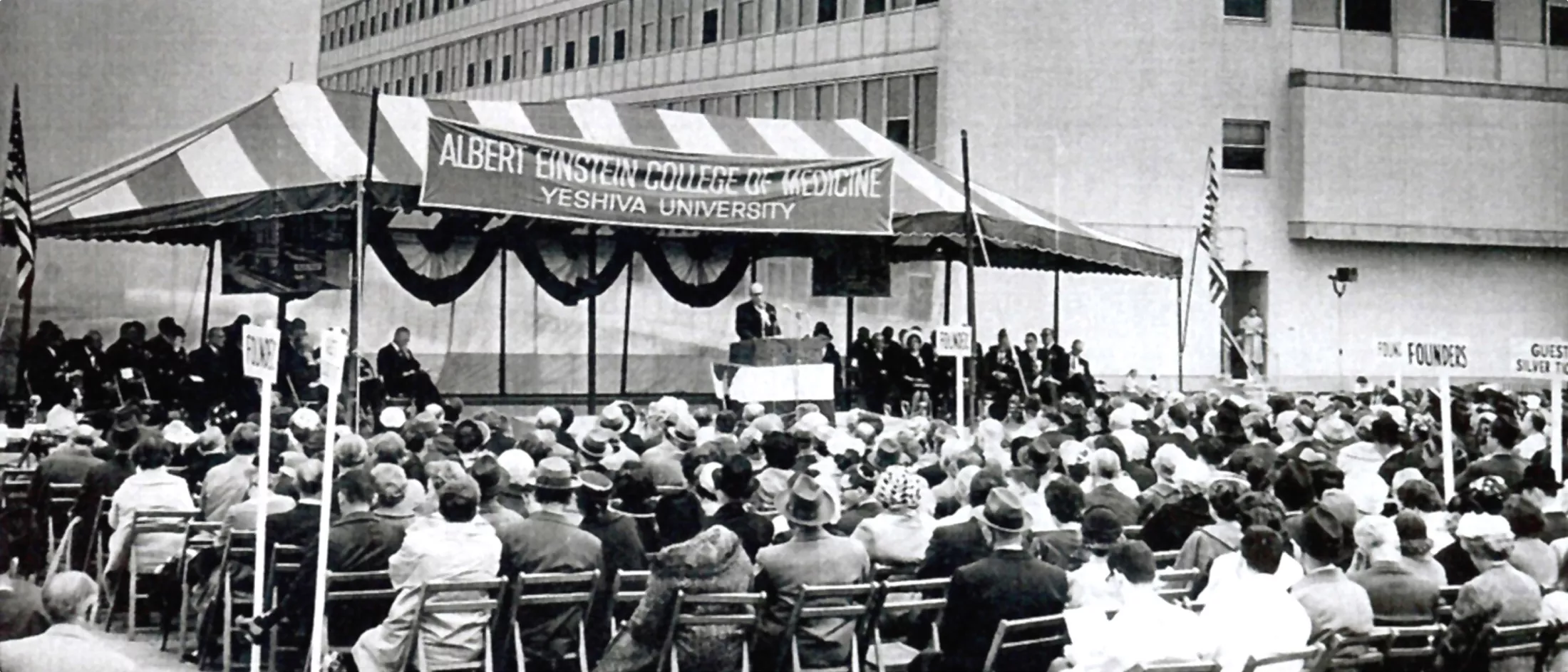
1950s
To better serve the needs of its economically challenged local Bronx community, Montefiore created the nation’s first hospital-based Department of Social Medicine in 1950.
In 1953, following an earlier amendment to Yeshiva University’s charter that placed patients of the future Bronx Municipal Hospital Center in the care of its faculty, Professor Albert Einstein formally agreed to let his name be used for the university’s newly established medical school.
Albert Einstein College of Medicine opened in 1955, welcoming its first class consisting of 53 men and three women, led by 75 faculty members.
In 1956, the Children's Evaluation and Rehabilitation Center (CERC) was established as part of the new Department of Pediatrics to serve children with developmental disabilities.
Montefiore physicians continued contributing major advancements in treating heart disease throughout the decade, developing a heart-lung machine used to correct congenital heart defects in children, creating a transvenous cardiac pacemaker in 1958 and inventing a way to monitor pacemakers by telephone.
Montefiore demonstrated its commitment to creating a compassionate and humane workplace for everyone, becoming the first hospital to recognize a hospital workers’ union in 1959 with a stand-alone 1199 Service Employees International Union (SEIU).
1960s
In 1963, Montefiore joined forces with Albert Einstein College of Medicine to become its teaching hospital, a place where medical students and residents could hone their skills within a culture of clinical excellence and patient-centered innovation.
Einstein became the first private medical school in New York City to establish an academic department of family medicine as well as the first to create a residency program in internal medicine with an emphasis on women’s health.
In 1964, Einstein was the first medical school in the United States to establish a department of genetics and also became one of three original Medical Scientist Training Programs (MSTPs) funded by the National Institutes of Health (NIH). The program is still in operation today and results in a combined MD/PhD degree.
Montefiore’s Dr. Martin Luther King Jr. Health Center opened in 1966 to bring comprehensive healthcare to the South Bronx community. That same year, Montefiore started one of the world’s first pediatric kidney treatment programs, including a kidney dialysis unit.
In 1969, the hospital of the Albert Einstein College of Medicine opened, subsequently named Jack D. Weiler Hospital. Montefiore assumed operation of it later that same year.
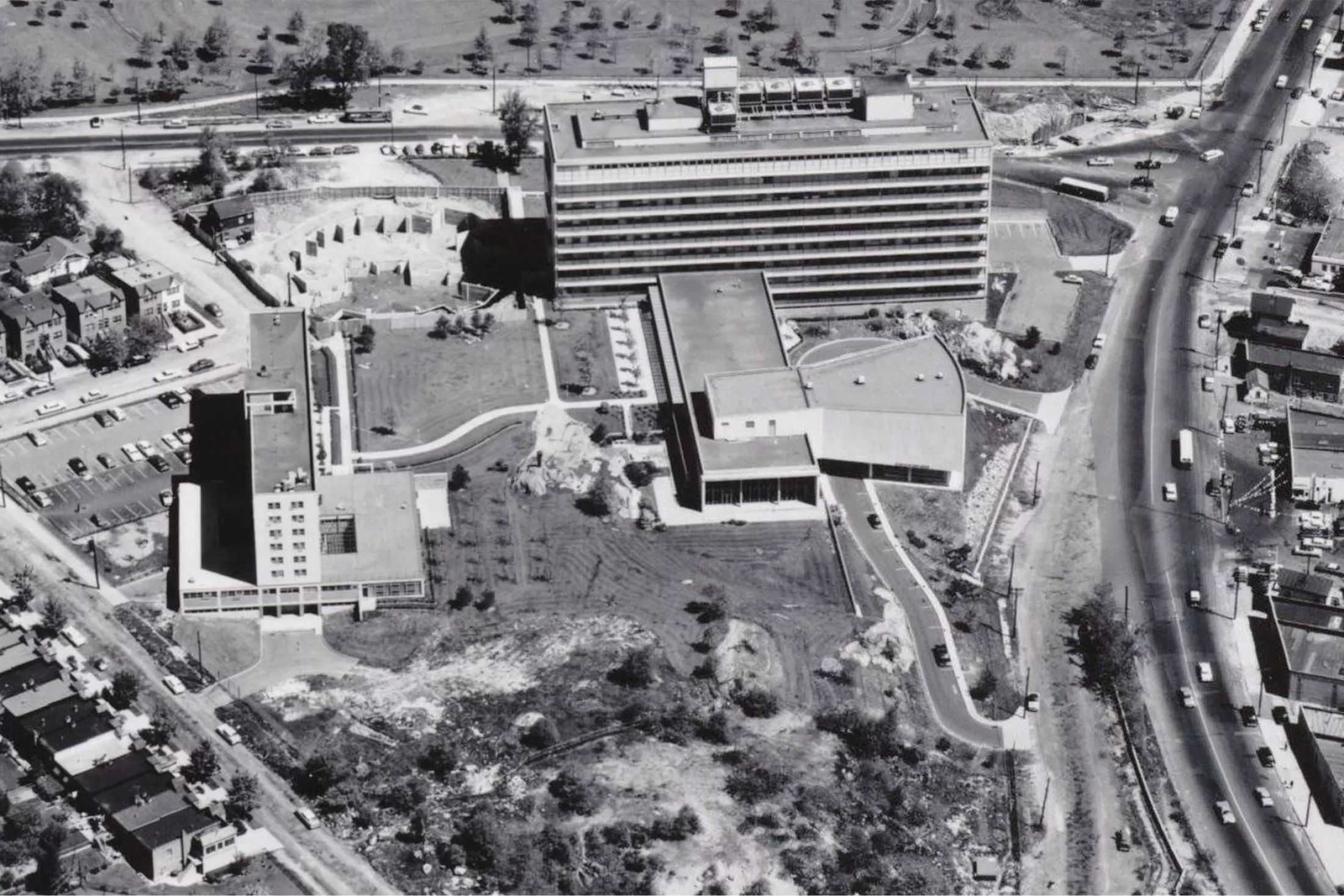
1970s
In 1970, Montefiore launched the community-based Lead Poisoning Prevention Program to make homes safe from hazardous lead, an initiative that is still active today and seen as a model for the rest of the nation.
In 1972, Einstein became home to the fourth National Cancer Institute (NCI)-designated cancer center in the country, now named Montefiore Einstein Comprehensive Cancer Center.
That same year, the Rose F. Kennedy Intellectual and Developmental Disabilities Research Center (IDDRC) opened, establishing Einstein at the forefront of research on normal and abnormal brain development with the goal of better understanding and treating related conditions.
Building on the success of Montefiore’s pediatric kidney treatment programs, its surgeons performed one of the nation’s first pediatric kidney transplants in 1972. The Arthur B. and Diane Belfer Educational Center for Health Sciences, opened by Einstein around the same time, provided additional laboratories and classrooms for basic science instruction.
In 1974, Einstein's Liver Research Center—now the Marion Bessin Liver Research Center—was the first institute in the nation devoted to the study of liver disease and injury, and it’s now the nation’s longest NIH-funded liver research center. Montefiore also achieved outstanding success in cancer treatments, pioneering minimally invasive robotic surgery for head and neck cancer in the 1970s as well as establishing the first specialized program in New York targeting endocrine and neuroendocrine tumors.
In 1978, the Belfer Institute for Advanced Biomedical Studies, a postdoctoral training program designed to prepare medical scientists for careers as independent principal investigators (PI), was established.
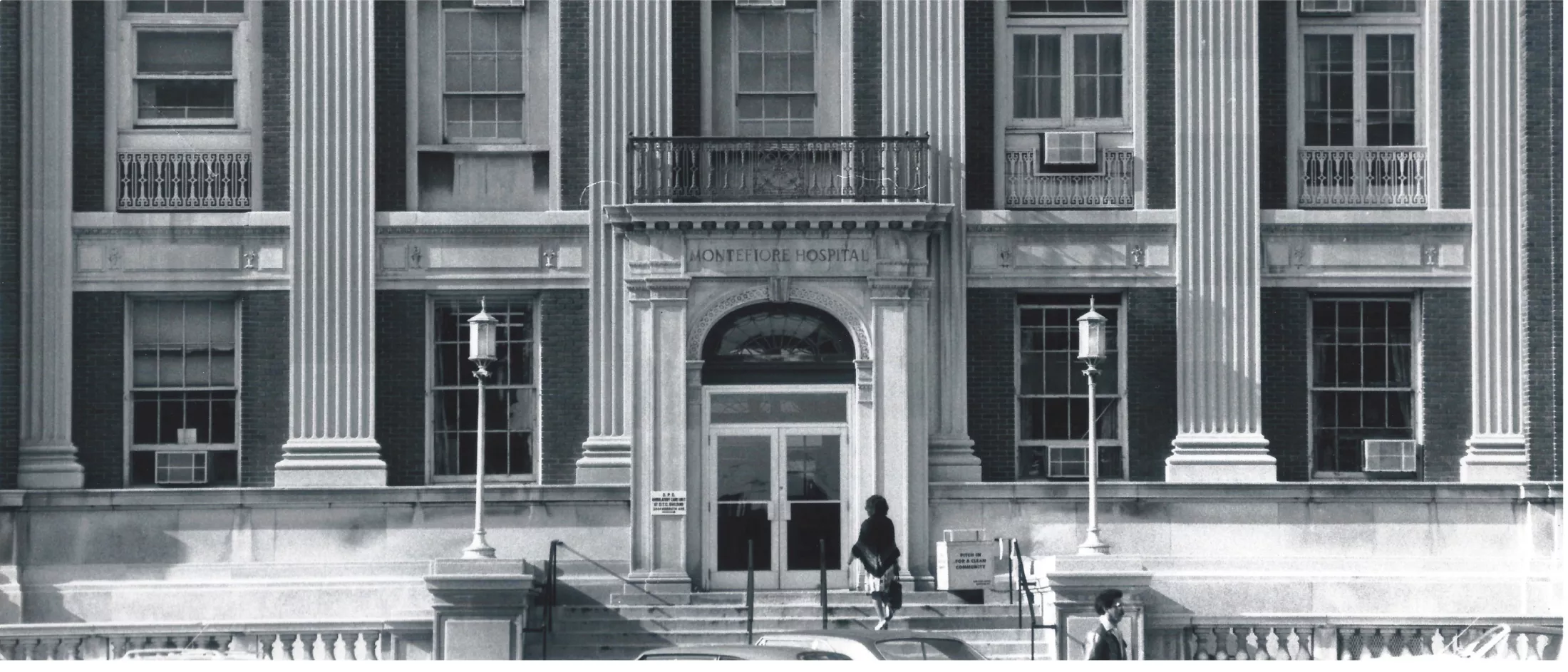
1980s
In 1980, Montefiore and Einstein merged their departments of medicine, bringing together the strength of each campus. Louis Sherwood, MD, became the first unified chair of medicine.
Also in 1980, the Jack and Pearl Resnick Gerontology Center was created to bring together all research activities and programs at the medical school related to aging, including Alzheimer's disease and other dementias.
The Mosholu Preservation Corporation was established in 1981, sponsored by Montefiore as a community development and renewal initiative—a powerful antidote to widespread housing deterioration and abandonment.
Over the course of this decade, Montefiore launched an early response to the emerging AIDS epidemic, earning designation as one of the first comprehensive AIDS centers in New York State. Montefiore also established the Child Protection Center, the first in New York dedicated to the evaluation, treatment, follow-up and prevention of child abuse.
In 1988, the first Center for AIDS Research at Einstein was funded by the NIH.
1990s
Montefiore employed joint Montefiore Einstein faculty in 1990.
In 1991, Montefiore was the first hospital to use Taxol, a drug whose mechanism of action was discovered by researchers at Albert Einstein College of Medicine in 1977, to successfully treat throat cancer.
During this decade, surgeons at Montefiore became the first in the US to perform a minimally invasive repair of an abdominal aortic aneurysm (AAA). In 1992, they received approval to perform heart transplants, and today Montefiore has one of the highest heart transplant survival rates in the nation.
Montefiore demonstrated its global reach in the 1990s by partnering with the Rabin Medical Center in Israel to create an educational and training exchange program for health professionals and to collaborate on research.
The New York Children’s Health Fund began a collaboration with both Montefiore and Einstein in 1993 and established the South Bronx Health Center to serve children and families in the community. Montefiore created the Care Management Organization (CMO) to help patients coordinate medical care and focus on improving clinical quality, enhancing patient experiences and reducing healthcare costs.
In 1994, Albert Einstein College of Medicine became the only New York City medical school selected by the NIH to participate in the Women's Health Initiative, the largest research study of women's health ever.
Further expanding the research capabilities of the College of Medicine, Einstein’s Samuel H. and Rachel Golding Building, a 10-story biomedical research facility, opened in 1996.
In 1999, Einstein opened the first student-run health clinic in New York State, becoming a national model.
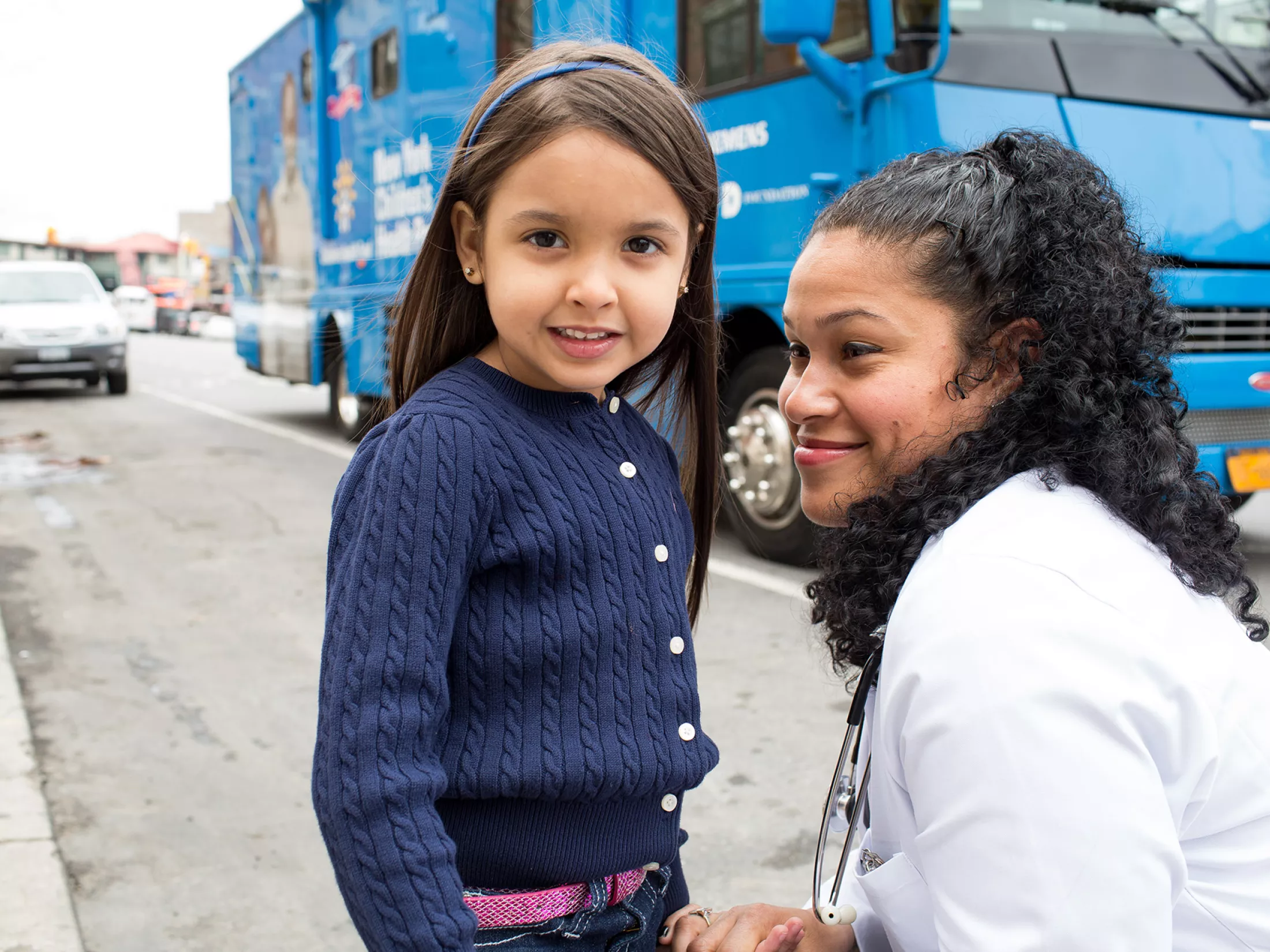

2000s
Children’s Hospital at Montefiore Einstein (CHAM) opened in 2001, housed in a technologically advanced state-of-the-art facility. Since the inception of U.S. News & World Report's children's hospitals rankings in 2007, CHAM has consistently ranked as one of the best in the nation.
That same year, Montefiore developed a Code of Organizational Ethics, becoming one of the first medical centers in the nation to do so. The code was an explicit statement of Montefiore’s ethical principles that are built into decision-making at all levels, including the obligation to cultivate quality clinical care, pursue a socially responsible agenda and manage resources wisely.
In 2002, the Gruss Magnetic Resonance Research Center opened. Among the nation's most technologically advanced research centers for magnetic resonance (MR) spectroscopy, its leading-edge technology provides some of the most detailed images ever seen of the anatomy and physiology of living organisms.
In 2003, our researchers discovered several longevity genes, which are genetic variants associated with exceptional longevity in humans.
Montefiore made national headlines again in 2004 when surgeons performed the first successful operation to separate twins joined at the tops of their heads.
In 2006, the former Our Lady of Mercy Hospital became part of Montefiore Health System and was renamed Montefiore Hospital/Wakefield Campus.
In 2008, Einstein embarked on a major expansion program that effectively doubled the size of its campus, including opening the Michael F. Price Center for Genetic and Translational Medicine and the Harold and Muriel Block Research Pavilion. The two new facilities brought together world-class scientists and the most advanced technology to facilitate the translation of discoveries at the molecular level for the treatment, cure and prevention of diseases.
In 2009, CHAM successfully performed the first pediatric heart transplant in the Bronx. Einstein, meanwhile, transformed a former tuberculosis sanatorium into a research and education space, including the Ruth L. Gottesman Clinical Skills Center, dozens of wet and dry labs and several of Einstein’s research programs on aging. That same year, our researchers found that lifestyle changes could stave off diabetes for more than a decade.
Montefiore and Einstein reaffirmed their partnership toward the end of the decade, with both institutions agreeing to have Einstein administer all research grants awarded to Montefiore.

2010s
In 2010, a rare dual heart and liver transplant was performed by Montefiore’s transplant team. During this decade, Montefiore also became the only center for Rett syndrome and Williams syndrome in the tristate area, providing care to children with these rare and complex conditions.
Montefiore surgeons received training in 2011 to implant the SynCardia temporary total artificial heart (TAH-t), a replacement heart for patients at risk of imminent death from heart failure as a bridge to human heart transplant. Today, Montefiore is one of only two programs in the New York metropolitan area certified to implant this life-saving device.
Also in 2011, our researchers became the first to demonstrate that heading in soccer can lead to brain injury and, on another front, discovered how Ebola infects cells.
After 15 years of work, Montefiore received federal recognition from the Centers for Medicare and Medicaid Services in 2011 as a Pioneer Accountable Care Organization (ACO), one of the most significant milestones in Montefiore Einstein's history. Our highly integrated teams focus on communication, coordination of care across multiple settings, patient engagement and prevention to provide higher quality patient care while reducing costs.
In 2013, Montefiore became one of only two sites in New York City to participate in the landmark immunotherapy trial for Yescarta, a groundbreaking CAR T-cell treatment. CAR T-cell therapy modifies a patient’s own immune cells to have a heightened ability to identify and eliminate cancer cells.
Continuing a decades-long effort to unify departments, each with their own chair, Montefiore and Einstein jointly recruited faculty between 2012 and 2014.
In 2013, Montefiore New Rochelle Hospital, Schaffer Extended Care Center, Montefiore School of Nursing and Montefiore Mount Vernon Hospital became part of Montefiore Health System.
White Plains Hospital became part of Montefiore Health System in 2014.
During the 2010s, to improve educational experiences for trainees, Einstein began upgrading various facilities, including renovating the D. Samuel Gottesman Library, the Harold and Muriel Block Building, the Irwin S. and Sylvia Chanin Institute for Cancer Research, the Ullmann Research Center for Health Sciences and the Kennedy Building.
In 2015, Montefiore and Yeshiva University finalized an agreement that established Einstein as its own legal entity and transferred operational and financial responsibility for the College of Medicine to Montefiore.
Burke Rehabilitation Hospital became part of Montefiore Health System in 2016.
In 2017, Montefiore developed a novel therapy for certain rare lymphomas, resulting in the first Einstein-developed drug.
Montefiore St. Luke’s Hospital became part of Montefiore Health System in 2017.
In 2018, our doctors and scientists led the largest randomized adjuvant breast cancer trial ever conducted, the groundbreaking Trial Assigning Individualized Options for Treatment (Rx) (TAILORx), which redefined treatment for tens of thousands of people suffering from the most common type of breast cancer.
Montefiore Nyack Hospital became part of Montefiore Health System in 2018.
In 2019, the New York State Education Department Board of Regents awarded Einstein an absolute charter, establishing it as an autonomous educational institution with the authority to confer its own medical and graduate degrees.
In 2019, Philip O. Ozuah, MD, PhD, is named President and CEO of Montefiore Medicine, the umbrella organization of the umbrella organization for Albert Einstein College of Medicine and Montefiore Health System.

Present
Montefiore Einstein Advanced Care opens in Westchester in 2021 and in Manhattan in 2023. Our world-renowned physicians and specialist teams provide centralized, comprehensive care in more than 20 specialties.
In 2022, two luminary scientists at Albert Einstein College of Medicine were awarded a patent for a novel strategy that could revolutionize the treatment of a wide variety of major infectious diseases. By selectively boosting the immune response of the body’s T cells, this strategy may prevent the recurrence of HIV infection in AIDS patients after cessation of antiretroviral treatment. This same technology holds promise for the treatment of other viral infections and can also be used to target cancers such as melanoma and pancreatic cancer.
Specialty Surgeons of Connecticut opened in 2022, Montefiore Einstein’s first affiliate in Connecticut.
Montefiore Einstein successfully performs the world’s first HIV-positive to HIV-positive heart transplant.
In 2021, the Middle States Commission on Higher Education (MSCHE), the organization that accredits universities and colleges, granted Einstein full independent accreditation for all doctoral, masters and certificate programs, completing the College of Medicine’s transformation to a fully independent academic entity.
In 2023, Montefiore Einstein Comprehensive Cancer Center achieved comprehensive designation by the NCI, placing it among the elite 1% NCI Comprehensive Cancer Centers in the U.S.
Montefiore Einstein opened the doors to its new, state-of-the-art Breast Care Center at Its Hutchinson Campus in 2023. The center offers comprehensive breast care with the latest mammography technology available in a tranquil, beautifully designed environment.
Greenwich Street 497 opened in 2023 and offers our aesthetic patients a unique downtown location that reflects our desire to provide a distinctive destination, merging luxury, hospitality, state-of-the-art outpatient care and advanced surgical expertise along with wellness, nutrition, and a complementary array of aesthetic services.
In 2024, Montefiore's Albert Einstein College of Medicine announces free tuition in perpetuity for all medical school students. This is made possible by a transformational gift—the largest made to any medical school in the country—from Ruth L. Gottesman, EdD, Chair of the Einstein Board of Trustees and Montefiore Health System board member. This historic gift will ensure that no student at Einstein will have to pay tuition again.




